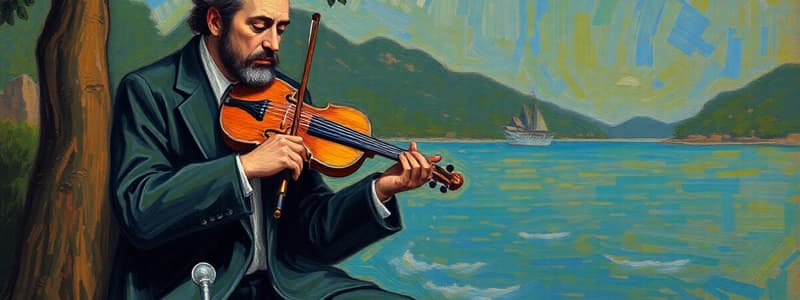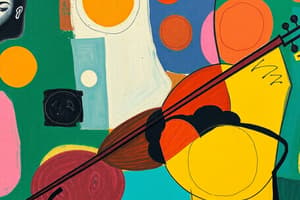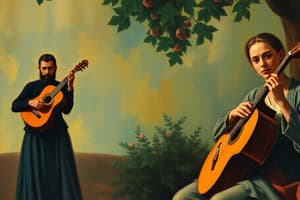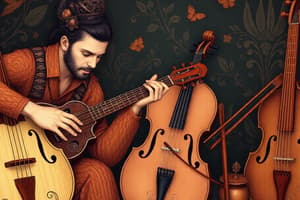Podcast
Questions and Answers
What was Villa-Lobos' primary role after returning to Brazil in 1930?
What was Villa-Lobos' primary role after returning to Brazil in 1930?
- Composer for film scores
- Director of music education (correct)
- Director of the Brazilian Academy of Music
- Music director for Rio's street bands
Which of the following statements is TRUE about Villa-Lobos' early musical career?
Which of the following statements is TRUE about Villa-Lobos' early musical career?
- Villa-Lobos quickly gained recognition for his unique sound.
- Villa-Lobos primarily composed chamber music and string quartets.
- Villa-Lobos' music was highly influenced by classical European composers.
- Villa-Lobos' work was initially met with mixed reception. (correct)
What was Villa-Lobos' main source of inspiration for his work?
What was Villa-Lobos' main source of inspiration for his work?
- The technical innovations of Arthur Rubinstein
- The folk music of Brazil's interior (correct)
- The European classical tradition
- The music of Igor Stravinsky
What is the uirapuru?
What is the uirapuru?
How did Villa-Lobos' musical instruction differ from traditional methods?
How did Villa-Lobos' musical instruction differ from traditional methods?
What was Villa-Lobos' approach towards incorporating Brazilian folk music into his works?
What was Villa-Lobos' approach towards incorporating Brazilian folk music into his works?
Which of these is NOT a key element of Villa-Lobos' musical style?
Which of these is NOT a key element of Villa-Lobos' musical style?
What is the violinophone?
What is the violinophone?
What aspect of Villa-Lobos' life is highlighted in the phrase, "I learned music from a bird in the jungles of Brazil, not from academies"?
What aspect of Villa-Lobos' life is highlighted in the phrase, "I learned music from a bird in the jungles of Brazil, not from academies"?
Why was Heitor Villa-Lobos considered a nationalistic composer?
Why was Heitor Villa-Lobos considered a nationalistic composer?
Flashcards
Heitor Villa-Lobos
Heitor Villa-Lobos
A Brazilian composer known for blending folk music with classical styles.
Folk Music Collection
Folk Music Collection
Heitor collected folk music during travels through Brazil's interior.
Ballets Russes
Ballets Russes
A dance company that introduced Villa-Lobos to Igor Stravinsky's music.
Uirapurú
Uirapurú
Signup and view all the flashcards
Director of Music Education
Director of Music Education
Signup and view all the flashcards
Nationalistic Music
Nationalistic Music
Signup and view all the flashcards
Creative Storyteller
Creative Storyteller
Signup and view all the flashcards
Composer's Journey
Composer's Journey
Signup and view all the flashcards
Fruitful Career
Fruitful Career
Signup and view all the flashcards
Influential Friendship
Influential Friendship
Signup and view all the flashcards
Study Notes
Heitor Villa-Lobos Biography
- Born in Rio de Janeiro, Brazil in 1887
- His father encouraged him to play cello, guitar, and clarinet
- Supported his family after his father's death by playing music in cafes and theaters
- Traveled extensively throughout Brazil, collecting folk music (1905-1907)
- Played with street bands while studying at National Institute of Music
- Studied indigenous music in Brazil's interior (1912)
- Married Lucila Guimarães, a pianist
- Received a government grant to study music in Paris (1923)
- Became director of music education in Brazil (1930)
- Founded the Brazilian Academy of Music and became its first president (1945)
- Suffered from poor health and died in Rio de Janeiro at age 72 (1959)
Villa-Lobos's Music
- Known for introducing Brazilian folk music and rhythms to the world of classical music
- Considered a passionate and popular musician who reformed Brazil's musical education system
- Wrote over 1,500 pieces, including concertos, symphonies, chamber music, string quartets, operas, ballets, and movie scores
- Some criticize his music as lacking polish, but he greatly impacted Brazilian music
Uirapuru
- An orchestral work composed in 1916
- Inspired by Brazilian folklore tales
- Features the uirapuru, a small bird of the Amazon rainforest
- Uses instruments like the violinophone to mirror the jungle sounds
- Portrays a dramatic tone poem representing the sounds of the jungle
- The uirapuru represents good luck in Brazilian mythology
National Pride
- Designed a new system of musical instruction for Brazilian children as the Brazilian government's director of music education
- Composed national and patriotic music for large choirs and public performances
- His choir in 1935 had 30,000 voices and 1,000 instrumentalists
- His work continues to instill national pride in Brazil
Early Reception
- His early works (like A Próle do Bébé) were not well-received initially and met with boos
- He was considered too modern for the time
Studying That Suits You
Use AI to generate personalized quizzes and flashcards to suit your learning preferences.



